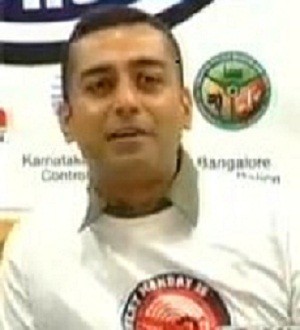
A couple of years ago, a traffic police officer once gave a briefing to a group of students in the Karnataka state capital Bangalore. There was something he told the gathering that day which made complete sense to the students, although it was meant to be a joke: The shortest unit of 'time' ever measured is what occurs when a traffic light goes green in Indian streets and the first honking sound you hear.
Indiscipline in Indian traffic has been a widely held notion, and there is little done to eradicate this menace. The most despised trend in Indian traffic is the fashion of honking for no or little reason. This is no secret to anyone who has ever stood in a normal crossway in any major city.
But not everyone in the country can tolerate this senseless blaring traffic. There are some who are bothered by this growing predicament. Last year, the city saw a group of campaigners advocating the need to have a more peaceful and less noisy environment. The campaign that was supported by the Bangalore Pollution Control Board discouraged drivers to honk unnecessarily. Ever since the campaign started, Mondays are observed as "No Honking Day" with traffic billboards glaring with the message "Do not honk unnecessarily".
Samar Vikram Bhasin, CEO of the company Pratham Motors which founded the campaign in Bangalore, believes that although it would not stop drivers from honking, it will definitely instill awareness in them. Speaking to the International Business Times, he said that ever since the campaign of 'No Honking Mondays" began there has been a notable decrease in the honking trend especially during Mondays.
He also listed some interesting facts about honking on Indian streets, such as the obscure belief held by German manufactures that an Indian honks in a year as much as any German driver would do in his entire life, and that vehicle manufactures have to make extra loud honks for Indian cars.
Here are some excerpts of the conversation with Bhasin on the campaign:
IBT: How did the campaign of "No-honking Mondays" start? What is the objective behind this?
Bhasin: The 'No Horn Monday' campaign started when we were brainstorming for a CSR activity in Koramangala and HSR Layout (local areas in Bangalore). We have started budgeting for CSR activities in our catchments areas. We felt the 1st CSR investment we should make is one that improves the traffic conditions and reduces stress levels in residential parts of south Bangalore. I also live in this area and would love to see changes for the better. After a process of elimination we felt that 'requesting people not to horn for 1 day in a week' would have a massive subliminal impact. The following are the subliminal impacts we were trying to create: (a) The commuter thinks about the feasibility of not honking. (b) The commuter has a realization that honking does increase stress (even for himself) while driving. (c) The commuter starts to question the necessity of honking at a particular scenario on the road.
We felt that 'planting the seed' which leads to this train of thought might get some people to honk less on the roads.
IBT: Have there been any effects in the "honking" trends in Bangalore and India at large ever since this campaign started?
Bhasin: The Bangalore Pollution Control Board has supported us whole heartedly during the campaign. We launched this campaign just after Diwali (last year), which is a time when everyone was thinking about noise pollution anyway. The decibel metres we put out during our campaign time showed a 5 percent reduction in decibel levels on specific intersections on Mondays. This information was given to the Pollution Control Board also. The impressive aspect is that we did manage to reduce noise pollution. I think this in itself should give us confidence that we can reduce noise pollution.
Aside from that, we got amazing support from the local media in sending the message out. Radio channels were promoting the campaign even though we did not speak to them or share any commercial terms with them about it! Newspapers covered the campaign for free. Volunteers from the Resident Owner's Association came out to put stickers on cars and bikes free of cost, and at their own spare time! So many of our customers put the 'No Horn Monday' stickers on their cars to support the campaign, we even got praises from people on social media platforms.
This was all very encouraging and heartening to us.
IBT: Do you think people will ever stop honking unnecessarily?
Bhasin: No, I do not think people will stop honking unnecessarily, but, while doing our campaign, we came across some interesting facts that I would like to share: (a) Indian Roads have the loudest honks in the world. (b) Car and bike manufacturers have to make extra loud honks for Indian cars. (c) Many manufacturers have upgraded the durability of the honks in their cars for Indian roads. (d) German Manufacturers believe that an Indian will honk more during the course of a year (while driving in India) than a German will during his/her whole driving life span (in Germany). (d) Louder Honks being sold as an accessory are very popular in India. These facts makes one think that we can make a change, slowly but surely. There is hope.
IBT: When there are thousands of reckless and undisciplined drivers out there in the street, isn't it almost inevitable that there will be honking?
Bhasin: It is inevitable to honk sometimes. I fully agree. We are not trying to ban honking forcefully. This campaign was intended to create a thought: "can I reduce the amount I honk?" The answer is 'yes' for all of us. We are requesting people to try it out.








